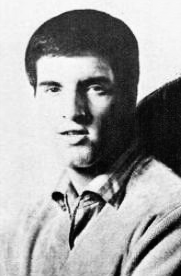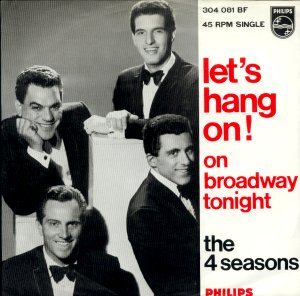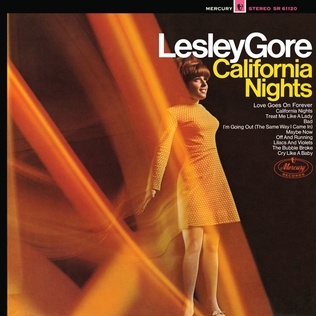
The Four Seasons is an American vocal quartet formed in 1960 in Newark, New Jersey. Since 1970, they have also been known at times as Frankie Valli and the Four Seasons. The band evolved out of a previous band called The Four Lovers, with Frankie Valli as the lead singer, Bob Gaudio on keyboards and tenor vocals, Tommy DeVito on lead guitar and baritone vocals, and Nick Massi on bass guitar and bass vocals. On nearly all of their 1960s hits, they were credited as The 4 Seasons. The band had two distinct lineups that achieved widespread success: the original featuring Valli, Gaudio, DeVito, and Massi that recorded hits throughout the 1960s, and a 1970s quintet consisting of Valli, Lee Shapiro, Gerry Polci, Don Ciccone and John Paiva, with Gaudio and Long providing studio support.

Robert John Gaudio is an American songwriter, singer, musician, and record producer, and the keyboardist and backing vocalist of the pop/rock band the Four Seasons. Gaudio wrote or co-wrote and produced the vast majority of the band's music, including hits like "Sherry" and "December, 1963 ", as well as "Can't Take My Eyes Off You" for Valli. Though he no longer performs with the group, Gaudio and lead singer Frankie Valli remain co-owners of the Four Seasons brand.

The Toys were an American pop girl group from Jamaica, New York, which was formed in 1961 and disbanded in 1968. Their most successful recording was "A Lover's Concerto" (1965), which sold more than two million copies and reached the number-two spot on the Billboard Hot 100 chart.
Sandy Linzer is an American songwriter, lyricist, and record producer, who is best known for his songwriting collaborations with Denny Randell and Bob Crewe in the 1960s and 1970s. He co-wrote hits including "A Lover's Concerto", "Let's Hang On!", "Working My Way Back to You", "Breakin' Down the Walls of Heartache", "Native New Yorker", and "Use It Up and Wear It Out". He was nominated with Randell for induction into the Songwriters Hall of Fame (SHOF) in 2012.
Denny Randell is an American songwriter and record producer, who is best known for his songwriting collaborations with Sandy Linzer and Bob Crewe in the 1960s and 1970s. He co-wrote hits including "A Lover's Concerto", "Let's Hang On!", "Working My Way Back to You", and "Native New Yorker", and was nominated with Linzer for induction into the Songwriters Hall of Fame (SHOF) in 2012.
Robert Stanley Crewe was an American songwriter, dancer, singer, manager, and record producer. Crewe co-wrote and produced a string of Top 10 singles with Bob Gaudio for the Four Seasons.

If I Should Love Again is the eighth studio album released by singer and songwriter Barry Manilow. The album was recorded at United Western Recording Studios in Los Angeles, California. The album was released in 1981, and it was certified gold.

The Complete Reprise Studio Recordings is a 1995 box set album by the American singer Frank Sinatra. The release coincided with Sinatra's 80th birthday celebration.
The Wonder Who? was a nom de disque of The Four Seasons for four single records released from 1965 to 1967. It was one of a handful of names used by the group at that time, including Frankie Valli and The Valli Boys. Wonder Who? recordings generally feature the falsetto singing by Valli, but with a softer falsetto than on "typical" Four Seasons recordings.
"Save It for Me" is a song written by Bob Gaudio and Bob Crewe. A song recorded in 1964 by The Four Seasons for their Rag Doll album, it was released as the follow-up record to the album's title song, which had hit the #1 position on the Billboard Hot 100 singles chart in July 1964. "Save It for Me" was also a success for the quartet, reaching the #10 position on the Billboard singles chart. It featured arrangement work by Denny Randell, who would later go on to become a songwriter for the group.

"Let's Hang On!" is a song composed by Bob Crewe, Sandy Linzer, and Denny Randell that was popularized by the Four Seasons in 1965.

"Opus 17 (Don't You Worry 'bout Me)" is a song composed by Sandy Linzer and Denny Randell and recorded by The Four Seasons in 1966 for their album Working My Way Back to You.

The Toys Sing “A Lover's Concerto” and “Attack!” is the sole album by the girl group The Toys. It was released in 1966 right after the success of the group's first two hits, both of which are mentioned in the album's title.

Action is the second album by the American garage rock band? and the Mysterians, released in 1967.

Bassey – The EMI/UA Years 1959–1979 is a 5-CD boxset compilation from Shirley Bassey issued in 1994, this set features 94 studio recordings on four CDs, recorded for EMI/United Artists between 1959 and 1979. Disc five features a previously unreleased live recording from Carnegie Hall. The boxset was reissued by EMI in 2010 in a standard jewel case set.

Pleasure Train is the first album by singer, songwriter, producer and composer Teri DeSario, released in 1978 by Casablanca.

Closeup is an album by Frankie Valli, released in February 1975 on the Private Stock label. It had been seven years since his prior album, and afforded Valli his first of two number-one solo hits in the US. The LP reached number 51 on the U.S. Billboard albums chart.

Working My Way Back to You and More Great New Hits is a 1966 album by The Four Seasons. Released in January of that year, the album is within the pop/rock genre. It included the top ten hit "Working My Way Back to You".

Lady Put the Light Out is an album by Frankie Valli, released in November 1977. It was his final album for Private Stock Records, which folded in early 1978.

California Nights is a 1967 album by Lesley Gore, the last of her seven albums released on the Mercury Records label. The title track on the album, California Nights, peaked at #16 and was Gore's last Top 20 hit. Bob Crewe produced seven of the tracks on the album, while Quincy Jones produced three. The album was reissued in 2015 as part of a compilation in both album and CD format by Ace Records, which included 15 bonus tracks from her Mercury catalogue.















